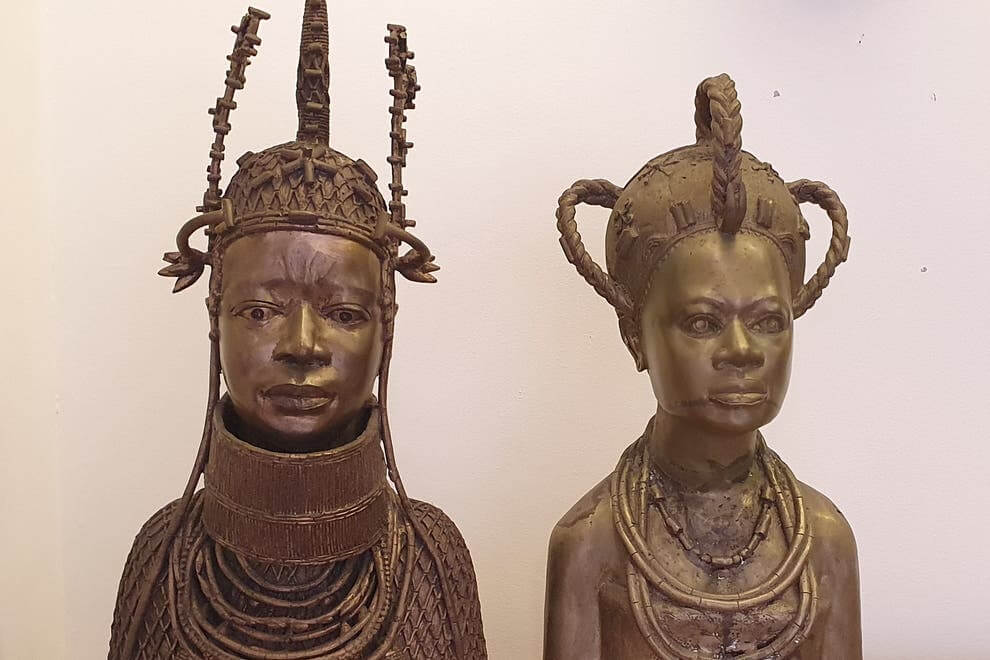
Church of England to Return Benin Bronzes To Lambeth Palace
Two Benin Bronzes which the Church of England intend to return to Africa / Lambeth Palace
The Church of England has promised to return two Benin Bronzes, given as gifts to former Archbishop of Canterbury Robert Runcie almost 40 years ago, to Nigeria.
“We have recently been contacted by the Digital Benin project at the MARKK (Hamburg) who enquired about our collection of gifts at Lambeth Palace and if we had received any Benin kingdom objects as gifts over the years,” the spokeswoman of Lambeth Palace, the official home of the Archbishop of Canterbury, said.
“In response, we have confirmed to the Digital Benin project that we have two bronze busts, given to us by the Benin kingdom in 1982,” she said.
She said the busts “were gifted to Archbishop Robert Runcie by His Excellency Chief (Prof.) Ambrose F. Alli and the University of Nigeria, Nsukka.”
“We have offered for the two busts to be included in the Digital Benin project and eventually, returned to our friends in Edo, Nigeria where they may remain. We are currently in discussions with the EMOWAA, via the Legacy Restoration Trust, to arrange this,” she added.
Benin was attacked by British troops in 1897 with around 5,000 works of art plundered and spread across the globe which are now being tracked by online project gathering information about them.
This is coming amid growing pressure on institutions to return looted works of arts with the Horniman Museum in Forest Hill one of the latest to take steps to potentially hand back exhibits.
The museum worked with Nigerian Londoners to develop its policy and says it is open to the “possible return” of objects “acquired at different times and under a range of circumstances, some of which would not be appropriate today, such as through force or other forms of duress”.
The Horniman statement went on to say “We understand that for some communities – whether in countries of origin or in the diaspora — the retention of some specific objects, natural specimens or human remains is experienced as an ongoing hurt or injustice.”
Demands for the restitution of exhibits to their original countries is one of the biggest issues facing London’s major museums.
Mwazulu Diyabanza, a pan-African movement called Yanka Nku (Unity, Dignity and Courage), is on a mission to recover all works of art and culture taken from Africa to Europe. He calls his method “active diplomacy”.
Last June, in between French lockdowns, Diyabanza and several others entered the Quai Branly museum in Paris, which has around 70,000 objects from sub-Saharan Africa. Shouting “We’re taking it home!” they wrenched from its setting a 19th-century African funeral post that belonged to the Bari people of Chad. Police recovered the object and held Diyabanza in custody for three days. A judge fined him €1,000 for “attempted theft”.
On its website, the British Museum admits that some objects in its Africa collections have “difficult histories, including the contested means by which some collections have been acquired, such as through military action”.
“The British Museum is actively engaged in re-examining the acquisition histories of such collections and caring for them with appropriate respect, in close dialogue with African partners,” the website adds.
The 900 objects from the Kingdom of Benin are particularly problematic. They include exhibits that were looted from Benin City by a British military force in 1897, most famous among them the mesmerising Benin bronzes, created from the 16th century onwards by specialist guilds.
“The Royal Palace was burned and destroyed,” the museum’s website explains.
“It’s shrines and associated compounds were looted by British forces, and thousands of objects of ceremonial and ritual value were taken to the UK as official ‘spoils of war’, or distributed among members of the expedition according to their rank.”

